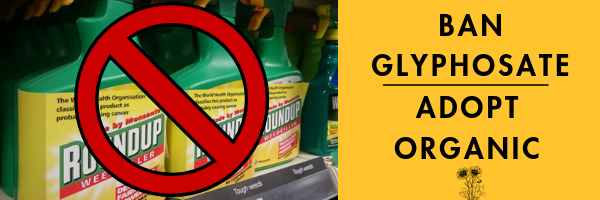14
Jul
Mexico Announces Glyphosate-Roundup Phaseout
 (Beyond Pesticides, July 14, 2020) The Mexican government announced late last month that it plans to phase out the importation and use of glyphosate in the country over the next four years. The announcement means that Mexico will join other countries, such as Luxembourg, Vietnam, Germany in prohibiting the chemical and the toxic consumer products, like Roundup, that contain it as an ingredient. International watchdogs are keeping an eye on reactions from the United States, which in recent years has worked to intervene in other countries’ decision-making over toxic pesticides.
(Beyond Pesticides, July 14, 2020) The Mexican government announced late last month that it plans to phase out the importation and use of glyphosate in the country over the next four years. The announcement means that Mexico will join other countries, such as Luxembourg, Vietnam, Germany in prohibiting the chemical and the toxic consumer products, like Roundup, that contain it as an ingredient. International watchdogs are keeping an eye on reactions from the United States, which in recent years has worked to intervene in other countries’ decision-making over toxic pesticides.
The government’s announcement cites the Precautionary Principle as part of its decision-making. According to the Wingspread Statement on the Precautionary Principle, “Where an activity raises threats of harm to the environment or human health, precautionary measures should be taken even if some cause and effect relationships are not fully established scientifically.” In the case of glyphosate, there is strong evidence, per a 2015 review by the International Agency for Research on Cancer (IARC), that glyphosate is carcinogenic. Since 2015, several more publications have added weight to glyphosate’s link to cancer. A February 2018 meta-analysis finds “a compelling link between exposures to GBH [glyphosate-based herbicides] and increased risk of NHL [non-Hodgkin lymphoma]. A February 2019 University of Washington study found that glyphosate increased the risk of non-Hodgkin lymphoma by as much as 41%.
Víctor M. Toledo, Mexico’s Minister of the Environment, said in a press release that the effort is part of decision steps to transform the county’s food system to make it “safer, healthier and more respectful of the environment (más seguro, más sano y respetuoso con el medio ambiente).” The country will be analyzing alternatives to glyphosate, importantly, focusing in management experiences and practies used by farmers in indigenous communities for thousands of years.
Cancer is far from the only health impact demonstrably linked to exposure to glyphosate-based herbicide formulations. glyphosate (and the adjuvant ingredients in formulations) is also linked to endocrine disruption, reproduction harm, and renal and hepatic damage, and toxicity to fish and other aquatic organisms. A 2018 Washington State University study determined that residents living near areas treated with the herbicide are one-third more likely to die prematurely from Parkinson’s disease. Studies also find that glyphosate is linked to multi-generational adverse health effects, including prostate, ovarian, and kidney diseases.
The Mexican government will launch an educational campaign to educate residents on the health risks involved with the use of glyphosate products. Minister Toledo sums of the concerns well, noting that this is a problem everyone must act on; “beyond productivity, there is human and environmental health (más allá de la productividad, está la salud humana y Ambiental),” he said.
The U.S. government has acted antagonistically to countries that have begun to phase out toxic pesticides like glyphosate. Last month, the U.S., alongside the Bolsonaro government in Brazil, launched complaints against Thailand with the World Trade Organization after the country added paraquat and chlorpyrifos to its list of hazardous substances. Due to U.S. pressure, Thailand had already delayed implementation and dropped its intent to include glyphosate on its hazard list.
As Mexico will show over the next decade, there are readily available alternatives to glyphosate that do not put human health and the environment at unnecessary risk. Organic practices represent a path forward that eschews the use not only of glyphosate but the myriad of other toxic pesticides registered by environmental agencies. See Beyond Pesticides’ Organic Agriculture program page for more information on why supporting organic is the right choice.
All unattributed positions and opinions in this piece are those of Beyond Pesticides.
Source: Medtruth, Mexican Government press release (translated page)










